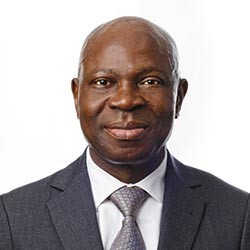Remarks by Gilbert Houngbo, President of IFAD, at the CFS High-Level Special Event "Making a Difference in Food Security and Nutrition"
IFAD Asset Request Portlet
ناشر الأصول
Remarks by Gilbert Houngbo, President of IFAD, at the CFS High-Level Special Event "Making a Difference in Food Security and Nutrition"
موقع: Virtual event
08 فبراير 2021Excellencies,
Honourable Delegates,
Colleagues,
Ladies and Gentlemen,
I welcome the new report from the High-Level Panel of Experts. In particular, I appreciate how the report clearly identifies an urgent need to strengthen and consolidate our thinking around food security and nutrition.
We need to widen our understanding of food security and of the pathways to better nutrition – for men, women, infants and children. And we need to adopt a food systems analytical and policy framework.
IFAD fully supports these findings, and the need for strategic thinking.
The new report provides more evidence that, as a community, we are falling short on the Agenda 2030 targets, especially SDG 2. It shows that food systems face a range of challenges linked to major trends in the drivers of food system change.
The pandemic has given the report greater urgency and made its findings sharper. As it says, and I quote: “The crisis has been a wake-up call to address the multiple complex challenges facing food systems.”
Most obviously, food systems need to be made more resilient and responsive to the the needs of consumers and producers alike. For poor people, food is both their sustenance and their livelihood. We need food systems to be equitable and fair to producers, processors and everyone along the value chain.
This means making them more equitable and inclusive, empowering and respectful, regenerative, healthy and nutritious, as well as productive and prosperous for all.
This clearly links back to the right to food. This is the moment to come together to take consistent action across food systems, and to implement policies in a more coordinated way.
The Voluntary Guidelines on Food Systems and Nutrition are a great example of how partnership can deliver positive results. We look forward to their adoption this week.
The need for strategic thinking is urgent; this thinking must be underscored by concrete measures. We must take action in solidarity to ensure the right to food.
We need to think especially of the needs of the most vulnerable. Food systems need to work for the most marginalized, including small-scale producers and workers. This is a responsibility for all: governments and the private sector alike.
Ladies and gentlemen,
The COVID pandemic is a global crisis. But it is not the first, and very likely will not be the last.
We need to do better. Food systems need to be transformed to reduce their carbon footprint, preserve biodiversity, and provide healthy and affordable food for urban and rural people alike. They also need to be inclusive and fair to everyone along the value chain, including those most often marginalized: women, indigenous peoples, youth, and people with disabilities.
Through targeted and well-considered action, we can transform food systems, increase resilience, and fulfil our commitment to leave no one behind.
Thank you.
Not checked against delivery
